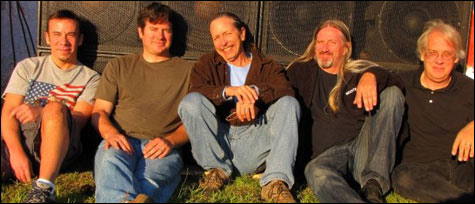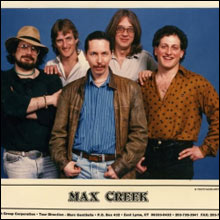
STAYING POWER Murawski (second from right) and friends. |
Imagine if the guys who started Max Creek never went to the famous Watkins Glen Summer Jam in 1973. The Grateful Dead, the Band, and the Allman Brothers Band attracted a mass of music fans to the Finger Lakes region of New York, and there the Creek boys fell under the deep spell of extended improvisation. Long story short, their lives were changed forever.
"Actually, I couldn't go," says Scott Murawski. "I was just too young." The guitarist was only 15 years old then, so Dave Reed, John Rider, and Bob Gosselin absorbed the intel from hippie central. Upon return, the Creek's country music traded a bit of its twang for a bunch of extrapolation.
"They saw that the Dead were doing some of the same traditional folk covers that we were doing, only electric," explains Murawski. "Like 'Going Down the Road Feeling Bad.' We did that song too, but as a bluegrass tune in the style of Woody Guthrie. It was like, 'Holy shit, that sounds great,' and all of a sudden we took off on that tangent, stretching out our solos, and writing in that style."
Fast-forward a few decades. Max Creek, with membership morphing a bit, are beloved stalwarts of improvisation, known for their swirling onstage interplay. They're an "anything goes" outfit, a group that steadily unfurls a song to discover its possibilities. These days their schedule has them bouncing to an array of gigs that celebrate their 40th anniversary. Longtime fans throughout New England know that Murawski, bassist Rider, keyboardist Mark Mercier, and drummers Scott Allshouse and Gregg Vasso can be counted on to keep the jamming alive.
This commitment to musical investigation has always been important to Max Creek. Just after their inception, the members drew up a mission statement that underscored their dedication to risk. Fairly pragmatic for a bunch of longhairs, eh? Murawski says fulfilling that promise is something that has kept the group invigorated throughout the years.

THE WAY THEY WERE A vintage promo photo. |
"We wanted the band to be a place where people could create and not be judged for their art. That's part of the longevity of it all. We pretty much allow everyone to take a shot at whatever they dream up. There's always a possibility that it's going to suck, but we don't care. That's what keeps things interesting. Personally I've been playing some of these songs for over 35 years. I could do 'em in my sleep. But the process of constantly changing things around has kept us on our toes."Twenty years ago "Leaves" was a fast reggae tune (Murawski cops to being a big fan of the Police). These days it's a slow-moving ballad that bets the farm on serious ardor. "It squeezes your brain by being so intense," he offers.
Another song, "Emerald Eyes," contains an instrumental coda that has become the tune's signature. One night the band fell into a jam that they all enjoyed, and decided to try to replicate it again and again. They couldn't exactly pull off the initial design, but they loved the permutations just as much.